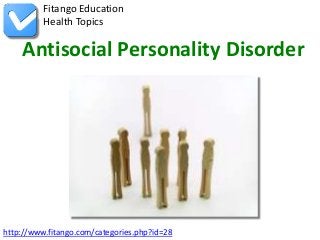
Antisocial Personality Disorder
- 1. Fitango Education Health Topics Antisocial Personality Disorder http://www.fitango.com/categories.php?id=28
- 2. Overview Antisocial personality disorder is a mental health condition in which a person has a long-term pattern of manipulating, exploiting, or violating the rights of others. This behavior is often criminal. http://www.fitango.com/categories.php?id=28 1
- 3. Symptoms A person with antisocial personality disorder may: • Be able to act witty and charming • Be good at flattery and manipulating other people's emotions • Break the law repeatedly http://www.fitango.com/categories.php?id=28 2
- 4. Symptoms • Disregard the safety of self and others • Have problems with substance abuse • Lie, steal, and fight often • Not show guilt or remorse • Often be angry or arrogant http://www.fitango.com/categories.php?id=28 3
- 5. Symptoms Like other personality disorders, antisocial personality disorder is diagnosed based on a psychological evaluation and the history and severity of symptoms. To be diagnosed with antisocial personality disorder, a person must have had conduct disorder during childhood. **** http://www.fitango.com/categories.php?id=28 4
- 6. Diagnosis For a doctor to be sure that a patient's behavior is not due to an existing organic condition three different diagnostic technics are employed. http://www.fitango.com/categories.php?id=28 5
- 7. Diagnosis **Laboratory tests** Which will include a CBC or complete blood count, a check of thyroid function and tests for substances such as recreational drugs and alcohol. http://www.fitango.com/categories.php?id=28 6
- 8. Diagnosis **Physical exam** This will include typical exams done on a routine check up such as checking vital signs, listening to the heart and lungs; taking height and weight and examining the abdomen** ** http://www.fitango.com/categories.php?id=28 7
- 9. Diagnosis **Psychological evaluation** A psychiatrist or mental health provider will ask about thoughts, feelings, relationships and behavior patterns. There will be questions about symptoms, when they started, their severity, how they impact daily life and whether similar symptoms have occurred in the past. Thoughts of suicide, self-injury or harming others will also be examined. http://www.fitango.com/categories.php?id=28 8
- 10. Diagnosis **Psychological evaluation** To be diagnosed with antisocial personality disorder, a person must meet the symptom criteria for that disorder listed in the "Diagnostic and Statistical Manual of Mental Disorders" (DSM). Symptom criteria for antisocial personality disorder from the DSM: Being at least 18 years old http://www.fitango.com/categories.php?id=28 9
- 11. Diagnosis **Psychological evaluation** Having had conduct disorder before age 15, that included acts such as stealing, vandalism, violence, cruelty to animals and bullying Repeatedly breaking the law Repeatedly conning or lying to others http://www.fitango.com/categories.php?id=28 10
- 12. Diagnosis **Psychological evaluation** Being irritable and aggressive, repeatedly engaging in physical fights or assaults Feeling no remorse after harming others, needing no justification Acting with no regard for the safety of yourself or others Acting impulsively http://www.fitango.com/categories.php?id=28 11
- 13. Diagnosis **Psychological evaluation** Those with antisocial personality disorder will not provide an accurate account of these signs and symptoms to a doctor. Evidence for the diagnosis is gathered by asking the family or friends of the patient detailed questions about the person's interactions and daily life. http://www.fitango.com/categories.php?id=28 12
- 14. Treatment Antisocial personality disorder is one of the most difficult personality disorders to treat. People with this condition rarely seek treatment on their own. They may only start therapy when required to by a court. http://www.fitango.com/categories.php?id=28 13
- 15. Treatment The effectiveness of treatment for antisocial personality disorder is not known. Treatments that show the person the negative consequences of illegal behavior seem to hold the most promise. http://www.fitango.com/categories.php?id=28 14
- 16. Causes The causes of antisocial personality disorder are unknown. Genetic factors and child abuse are believed to contribute to the development of this condition. People with an antisocial or alcoholic parent are at increased risk. Far more men than women are affected. The condition is common in people who are in prison. http://www.fitango.com/categories.php?id=28 15
- 17. Causes Fire-setting and cruelty to animals during childhood are linked to the development of antisocial personality. Some people believe that psychopathic personality (psychopathy) is the same disorder. Others believe that psychopathic personality is a similar but more severe disorder. http://www.fitango.com/categories.php?id=28 16
- 18. Additional Resources PubMed Health Psychology Today http://www.fitango.com/categories.php?id=28 17